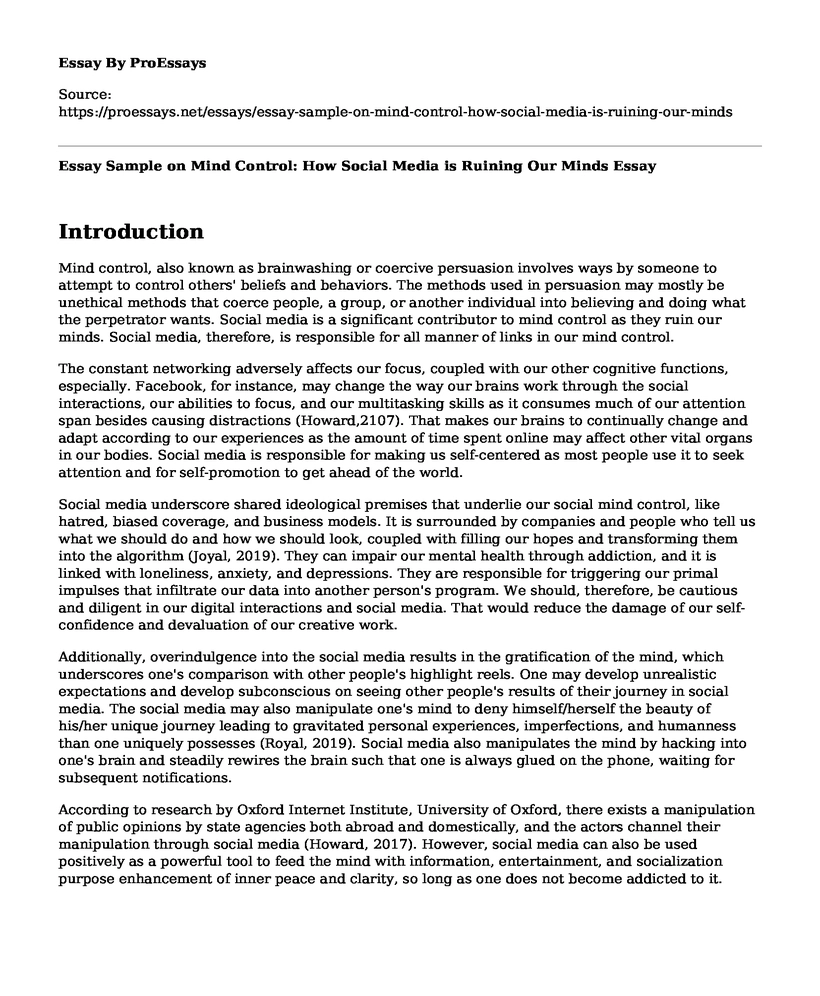Introduction
Mind control, also known as brainwashing or coercive persuasion involves ways by someone to attempt to control others' beliefs and behaviors. The methods used in persuasion may mostly be unethical methods that coerce people, a group, or another individual into believing and doing what the perpetrator wants. Social media is a significant contributor to mind control as they ruin our minds. Social media, therefore, is responsible for all manner of links in our mind control.
The constant networking adversely affects our focus, coupled with our other cognitive functions, especially. Facebook, for instance, may change the way our brains work through the social interactions, our abilities to focus, and our multitasking skills as it consumes much of our attention span besides causing distractions (Howard,2107). That makes our brains to continually change and adapt according to our experiences as the amount of time spent online may affect other vital organs in our bodies. Social media is responsible for making us self-centered as most people use it to seek attention and for self-promotion to get ahead of the world.
Social media underscore shared ideological premises that underlie our social mind control, like hatred, biased coverage, and business models. It is surrounded by companies and people who tell us what we should do and how we should look, coupled with filling our hopes and transforming them into the algorithm (Joyal, 2019). They can impair our mental health through addiction, and it is linked with loneliness, anxiety, and depressions. They are responsible for triggering our primal impulses that infiltrate our data into another person's program. We should, therefore, be cautious and diligent in our digital interactions and social media. That would reduce the damage of our self-confidence and devaluation of our creative work.
Additionally, overindulgence into the social media results in the gratification of the mind, which underscores one's comparison with other people's highlight reels. One may develop unrealistic expectations and develop subconscious on seeing other people's results of their journey in social media. The social media may also manipulate one's mind to deny himself/herself the beauty of his/her unique journey leading to gravitated personal experiences, imperfections, and humanness than one uniquely possesses (Royal, 2019). Social media also manipulates the mind by hacking into one's brain and steadily rewires the brain such that one is always glued on the phone, waiting for subsequent notifications.
According to research by Oxford Internet Institute, University of Oxford, there exists a manipulation of public opinions by state agencies both abroad and domestically, and the actors channel their manipulation through social media (Howard, 2017). However, social media can also be used positively as a powerful tool to feed the mind with information, entertainment, and socialization purpose enhancement of inner peace and clarity, so long as one does not become addicted to it.
References
Joyal, A. (2019, October).The Frightening Truth behind Mind Control and SocialMedia.Hackernoon.Retrieved from https://www.hackernoon.com
Howard. (2017, July).The Party Line: Manipulation and Mind Control through Social Media.The Royal Institute of International Affairs. Retrieved fromhttps://www.chathaamhouse.com
Cite this page
Essay Sample on Mind Control: How Social Media is Ruining Our Minds. (2023, Mar 12). Retrieved from https://proessays.net/essays/essay-sample-on-mind-control-how-social-media-is-ruining-our-minds
If you are the original author of this essay and no longer wish to have it published on the ProEssays website, please click below to request its removal:
- The Relationship Between the Architecture and the Arts
- Analysis of the PLOS Blogs Network
- Benefits of Decriminalizing Illicit Substances in Canada - Essay Sample
- Essay Sample on Technology, Human Trafficking & Social Change: Examining the Impact
- Essay Example on Bro, Socio-Cultural & Economic Trends Portrayed in Movies
- Essay Example on Badia on Trial: Sexual Abuse and Sodomy of 5-Yr-Old
- Essay Sample on Character Evolution of Daenerys Targaryen in the Series "Game of Thrones"







